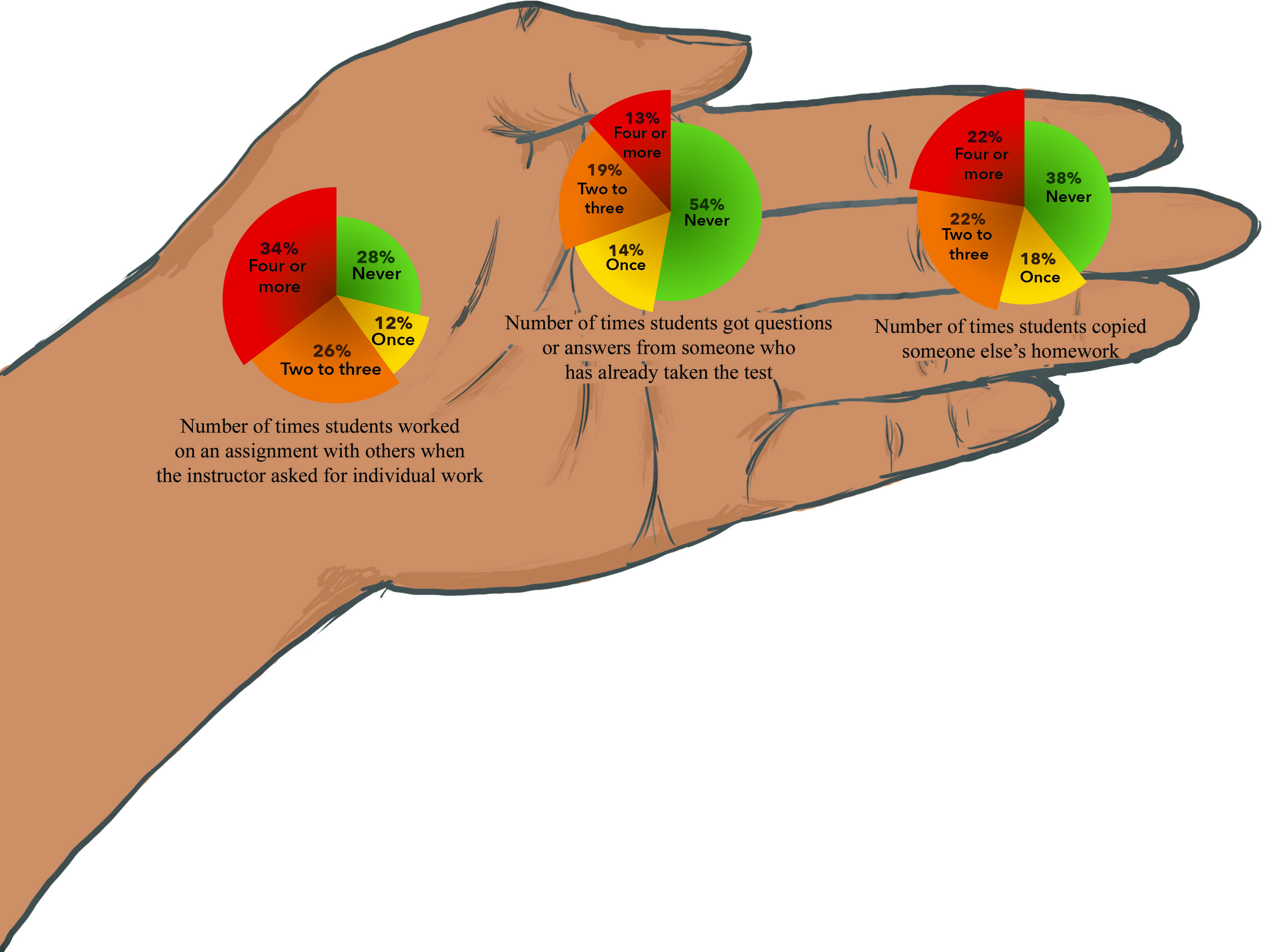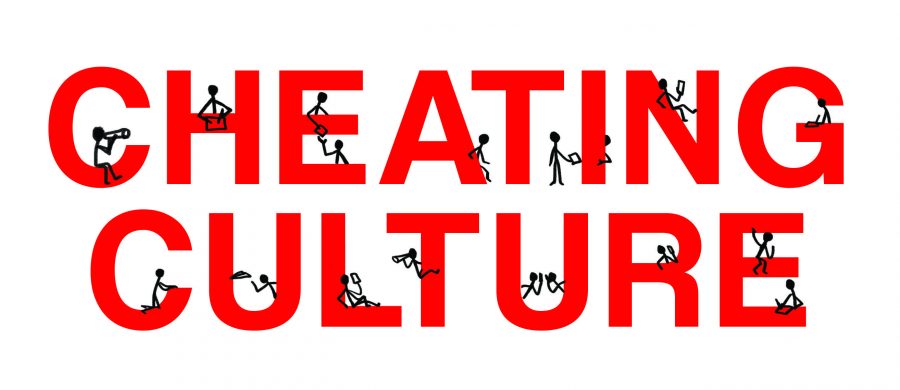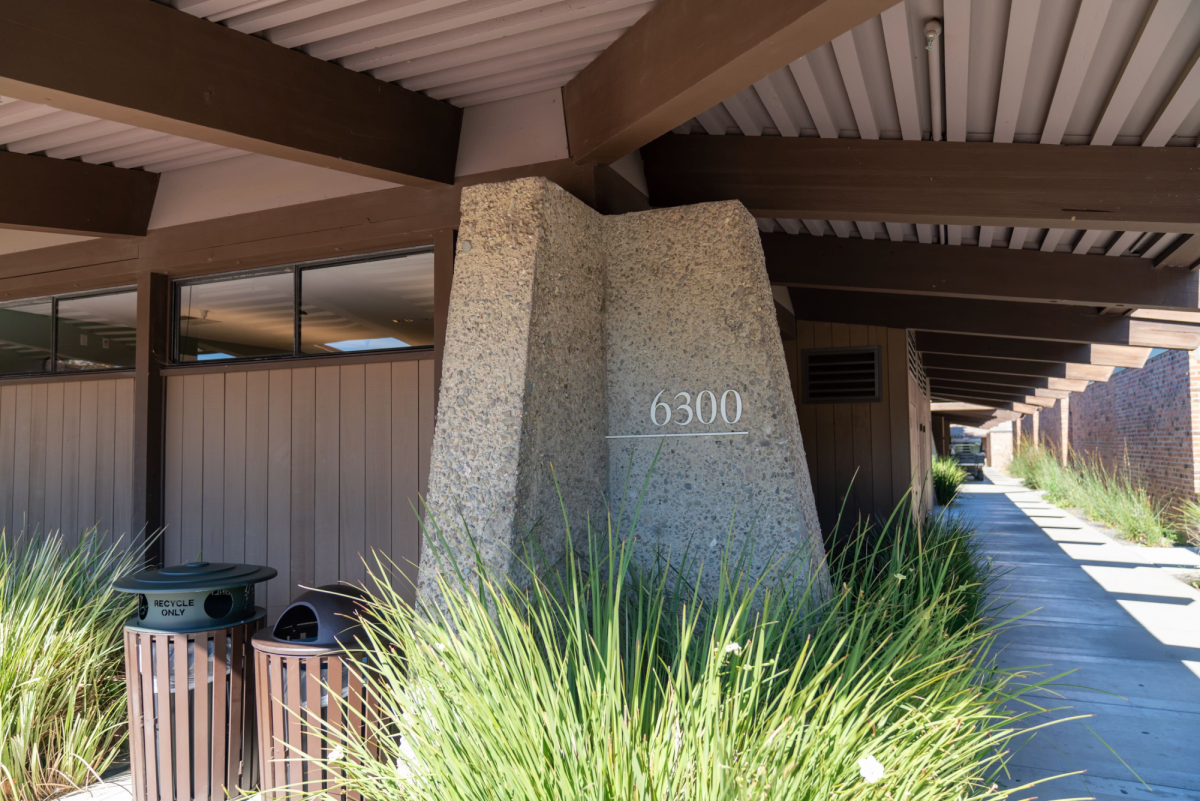Written by Shawna Chen and Janet Wang
It’s test day. You’re sitting at your desk, nervously tapping your pencil. You’ve prepared to the best of your ability, but your anxiety increases as you open the test booklet. One problem in particular is worth a lot of points, but you don’t know how to do it. You need to do especially well on this test to maintain your A in the class.
The teacher exits the classroom into the back of the science department’s atrium to converse with his teaching assistants. Do you pull out your phone to Google the answer?
Senior Gregory Duvall (name changed to protect the student’s identity) answered yes. “If you ask around, everybody’s getting such high grades and high SATs and things,” Duvall said. “You just feel the need to be better or be at least as good as them.”
Duvall, then a sophomore, calls the incident his most egregious act of cheating. “I feel pretty bad about that, but I got an A minus in that class and barely an A minus,” he said. “If I hadn’t looked up that answer, I definitely would’ve gotten a B plus.”
Definitions of cheating
In the beginning of the school year, students attended an assembly that analyzed various results from the 2015 Challenge Success Survey about student life. The survey revealed that only 13 percent of students had not cheated in any way in the past year. Various forms of academic integrity violations included copying someone’s homework, collaborative work without permission and passing on test questions from someone who had already taken it. The results also gave data on students’ own cheating habits, such as using cheat sheets, plagiarizing and using others’ work as their own.
According to Gunn’s academic policy, “cheating is taking (or lending), at inappropriate times a person’s work, information, ideas, research, and documentation, without properly identifying the originator, and/or acting dishonestly or unfairly in order to gain an advantage–a deliberate act of deception.”

If 87 percent of the 2000-student population at Gunn has cheated, then the underlying question of it all is: why?
The more clear-cut reasons
Cheating occurs for a wide range of reasons. While a less observable cause is rooted in the community mindset itself, a number of distinct issues lie within the structure of our school.
Principal Dr. Denise Herrmann says several general motivations exist for cheating. “I think that most of the time, it’s because they haven’t managed enough time for them to be able to do the work, the high quality work or learning, themselves,” she said. “Sometimes they just have too much on their plate, sometimes they have been afraid to ask clarifying questions in class, sometimes they think they understand it but they get home and they don’t.”
One of the most common forms of cheating at Gunn is copying answers from a peer’s assignment or the solutions manual. Senior Maritha Wang often observes students comparing and exchanging answers before big lab assignments are due in science classes. “I don’t think people cheat because they don’t think they’re capable of doing the assignment,” she said. “I think they just run out of time, and I feel like homework is easy points, so you kind of just feel dumb if you don’t end up getting an A in the homework category.”
Gunn’s cheating culture is further perpetuated, says sophomore Clara Kieschnick-Llamas, by an unequal emphasis on STEM (science, technology, engineering and mathematics) classes over arts and humanities courses. “Because we’re in Silicon Valley and we’re surrounded by people who do math and science, people think that those subjects are the most important to be learning,” she said.
Kieschnick-Llamas says she never sees cheating occurring in math or science classes but instead finds students cheating in classes that are “less important like language classes and history.”
Another contributing factor is miscommunication between teachers and students. In sophomore Jane Smith’s class, students were told that they would not need to study certain material for a quiz. “It turned out that the things that [were] not going to be on the quiz were on the quiz,” she said. Since the quiz was taken on a laptop on Schoology, students were able to easily open an additional tab and search up the answers.

Because her teacher misspoke about the content on the quiz, Smith believes that her cheating was justified. “I talked to people after the quiz and about 40 percent said that they had cheated not because of stress, but because of the fact that they thought it was completely unfair,” she said. “They felt that they didn’t have to have their grade suffer because of a teacher miscommunicating something and not being held responsible for it.”
A bigger issue is Gunn’s broad and overarching definition of cheating, senior Ben Lee says, which he feels is incorrectly applied on campus. “I feel like cheating at this age just naturally occurs, just like other things in life like stress and bullying,” he said. “Cheating is not asking someone for help or asking someone what they thought of the test. Cheating is taking someone’s test and using it for your own test.”
Using such an umbrella term, Lee says, is a disservice to students. By Gunn’s definition, a number of real-world businesses should be facing consequences too, but Lee notes that ramifications for the corporate industry do not exist. Companies constantly build off each other and essentially “cheat” to create new companies with similar services, Lee says. “Lyft, Uber and Wingz are basically the same thing with tiny changes and you can argue that they copied each other. They’re companies and they have certain rights,” he said. “But [the administration doesn’t] look to companies and accuse them.”
Psychology teacher Warren Collier believes students consider cheating when they become desperate. In Collier’s experience, when it comes to deciding between moral or utility values on the spot, one is not compelled to to be honest. “When we are in that desperate situation, the moral issues usually don’t become the main motivating factor,” he said. “When I’m sitting in that test, and I have no idea how to answer the question, I don’t usually think. ‘What is the right thing to do?’ I think, ‘I need to get this right.’”
Collier has witnessed students cheating in his classroom, and followed necessary guidelines set by the administration. Though he does not handle direct ramifications, the relationship between the teacher and student shifts. “For the teacher, it’s hard not to think, ‘Why doesn’t this student care about my class,’” he said. “Things get awkward because I’m emotional about it and the student is emotional about it.”
Collier did cheat in high school, and he carries the attached guilt to this day. “In the long run, you just feel dumb about making a poor choice. It’s important to have integrity as a person and I don’t think it’s worth sacrificing your integrity just for a couple more points,” he said. “The test or project will be gone by next month, but the fact that you cheated will be remembered for the rest of your life.”
What research shows about cheating
The reality is that we have lots of human values; honesty is one of them. “Conflicts arise every time human values collide with each other, and of course they collide with each other when we think about politeness,” Duke University Professor of Psychology Dan Ariely said, pointing to white lies. “But when it comes in collision with success, I don’t think people would thoughtfully say, ‘I want a life of flying over a life of honesty.’” People do it one time, find themselves on a slippery slope and do it again and again and again, Ariely says.
Studying and cheating, however, are not mutually exclusive. One can study and still cheat or cheat and still study. It all comes down to one’s conflicts of interest, says Ariely, who wrote “The Honest Truth About Dishonesty” about his research on dishonesty.
In society, students are naturally pushed toward getting good grades, Ariely says. This is reinforced by parents who treat students differently when they receive good grades and by the working world’s message that only the educated are hired. Naturally, then, a conflict of interest develops: sacrifice honesty or sacrifice good grades?

We see the world through our conflicts of interest, Ariely says. If you have a conflict of interest, you’re likely to feel motivated in the short term to gain in that way. “It’s certainly not a necessarily planned thought,” he said. “The students probably don’t think of themselves as villains; they just at the moment have a sense of wishful blindness—‘I don’t want to think about it this way and I really want to get a good grade.’”
The pressure to succeed only creates a higher conflict of interest. If students think that people around them are dishonest, that makes it easier for them to be dishonest as well.
Cheating as a necessary evil
If facing the same dilemma in college, Duvall doesn’t believe he will choose the same route. “In college, the stakes are a lot higher,” he said. Most students, he says, see good grades as a pathway for college, college as a pathway for a stable job and a stable job as the ultimate pathway to a successful life.
For Duvall, his decision to cheat on his test was a preventative measure—to avoid punishment from parents.
It is true that in Palo Alto, some parents exert a certain amount of pressure on their children to do well in school. Superintendent Dr. Max McGee reminds students, however, to be aware of the clash of cultural interests in the community. A number of parents in Palo Alto grew up with parents who survived the Great Depression and raised their children to value economic security. Because of this, Palo Alto parents may tend to place high importance on stability, which to them is best achieved through education. Some parents even immigrated into America in hopes of raising their family in a more promising environment.
Students, however, see things from a different perspective, and McGee believes open dialogue needs to occur in order to bridge the gap between parents and students. “We first need to understand cultural powers and pressures,” he said. “Then we need to work with parents and faculty on how these cultural factors impact students and how we can help kids manage the pressures.”
Cheating was also a practical matter for senior Aubrey Laurent (name changed to protect the student’s identity). In one of her classes, the teacher gave quizzes every week, but Laurent says the teacher never adequately prepared students in class for these assessments and instead assigned a large amount of outside work. “I do remember we brought up the amount of work with her in class once,” Laurent said. Her teacher replied that she needed to keep students busy so she could stay busy, Laurent says.
To pass one of these quizzes, which were more frequent and easier than tests, Laurent would have to study for one to to two hours while neglecting other schoolwork and activities. “As everybody in this class started to realize how ridiculous these quizzes were and how they weren’t really testing your knowledge—everybody was just power-memorizing the day before to get a passing grade—a lot more people turned to cheating,” Laurent said. She was even caught cheating once, but her teacher did not report her and there were no repercussions.

The majority of Laurent’s grade relied on scores received from these quizzes, she says. Though her cheating behavior began as a way to maintain a good enough grade without overburdening herself, at a certain point she became so used to cheating that she just kept doing it. “Why keep studying when it’s so easy?” she said. “When students are feeling way too overwhelmed, you have to give something up.”
Underlying pressure and expectations
Gunn’s academic environment is not isolated. According to a study conducted by Challenge Success, two-thirds of 6,294 students at 15 high-achieving schools reported not regularly being “fully engaged in their academic schoolwork, often associating absence of engagement with more frequent school stress, higher rates of cheating and greater internalizing, externalizing and physical symptoms of stress.”
Laurent says a lot of students feel that to be happy you have to make money and to make money you have to go to a good college, and that starts with high school—getting good grades. “That’s a lot of people’s mindsets, and I think unfortunately that’s also a lot of parents’ mindsets, too,” she said. “When everyone seems successful around you, you feel the pressure to be successful, too.”
After all, it is human nature to compare oneself to others, Duvall says. “I don’t see that changing because you’re always going to be curious about how other people do on a test, how other people do on an essay,” he said. “There’s no changing that.” Even if a peer is stretching the truth about a particular test score, such comparisons increase the inherent need to try harder and do better in school so one can “catch up.”
Wang also believes that students themselves have high standards. “Maybe it’s just growing up in the Silicon Valley, where everyone’s already so successful,” she said. “You have startups everywhere; Stanford is literally three blocks down from the street. When you’re in a culture of such excellent people, excellence becomes normal.”
Students face another issue when discussing colleges, most often hearing about prestigious schools like Harvard and not smaller liberal arts colleges. The same goes for the technology industry, Laurent says. “We hear of the parents’ companies that really took off and sold for millions of dollars, and that’s the issue,” she said. “We’re hearing this one-sided opinion of everyone becoming super successful [in their terms of success], and we’re never really hearing about the other 90 percent.”
Though asking for help from a teacher has become less taboo in the last few years, Duvall says peer pressure still contributes to a fear of requesting assistance. “Because there are so many high-achieving students at Gunn, it would seem like you’re weak if you went over and talked to a teacher,” he said.
The alumni Laurent speaks to often talk about how nice it is to be in a noncompetitive environment where students don’t compare grades or scores and peers take time out of their days to help you with your work. “Slowly, we have to become more aware and try our best not to be so grade-focused,” she said. She believes teachers must play a role in raising awareness and realize when they are assigning excess or busy work to help alleviate stress.

Parents, too, can play a role in diminishing students’ competitive mindsets, Duvall says. If parents can instead emphasize collaboration and openness early on in a child’s life, then students will be able to thrive in a healthier environment, without the constant pressure of having to do better than their peers.
Steps toward solutions
To start affecting change, McGee believes conversation must begin in the classroom. He points to the model of a freshman reflection seminar at a national university. These seminars are run by faculty and identify a hot issue related to student life that needs to be addressed. “We need to think about how we can create conditions for that kind of dialogue,” he said. The best outcome will only occur through full and complete honesty. McGee says if a teacher takes action against students who speak of a cheating experience in a space of open dialogue, it will not be tolerated.
Gunn administration is already planning to hold student focus groups in January to start drafting ideas to alleviate cheating. “Some of the possibilities would be to revise some policies in the student handbook or more opportunities for students for retesting and requizzing,” Herrmann said. Another idea she hopes will take root is the creation of a peer court, where a group of peers evaluate one’s actions and determine the measures needed to earn back the trust of teachers and classmates.
“Some of the possibilities would be to revise some policies in the student handbook or more opportunities for students for retesting and requizzing.”
—Principal Dr. Denise Herrmann
Nonetheless, an internal shift needs to occur, too. “[Students] think that just because they don’t get it right away, they’re not going to get it. If after some initial attempts at learning and they’re not getting it, they’re likely to slip into some poor choices,” Herrmann said. “We want to build on the idea of helping students develop a growth mindset, that it’s okay not to know something and that it’s okay to ask for help and it’s okay to be thinking over assessment over time.”
While some degree of cheating will always remain on campus, we must also realize that we are already quite honest. Ariely says what administrators can do to discourage cheating is create a strict, specific set of rules for behavior. When somebody says, “Don’t cheat,” it’s too broad and not enough to stop someone from behaving dishonestly. What we need are guidelines that clearly define what people are expected and allowed to do and not do. “We can make dishonesty harder,” he said. “We can remind people that a betrayal of honesty is a betrayal of a social good, and we can remind people of the importance of honesty.”
McGee goes a step further and asks the community as a whole needs to look at success from a more multidimensional angle. “When students feel like their ultimate final exam is what college they go to, they may be more inclined to cheat,” he said.
But life is about more than that, and your grades don’t define who you are. “The deepest satisfaction in my professional life is hearing from former students and how they impacted other people’s lives based on lessons they had learned in my classes,” McGee said. “That is my final exam.”











